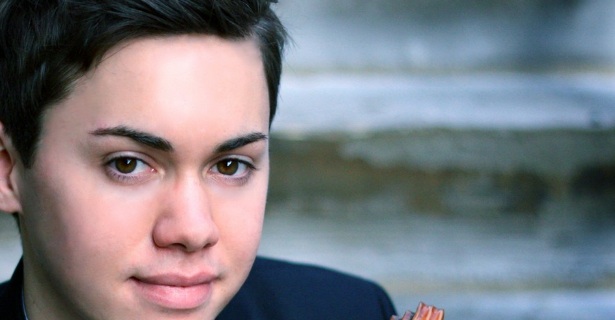
Benjamin Beilman proved better than "prodigy" at NMSO
Violin “Prodigy” Benjamin Beilman Inhabits Sibelius, Transfixes Popejoy
“Prodigy” is that small apotheosis reserved for the young. Mozart, Mendelssohn, Michael Jackson they have been clamored after, adored, given (a few) eminent celebrity. Yet, when “Violin Prodigy” hailed as the title of Benjamin Beilmans recent NMSO concert at Popejoy Hall, I was reminded of the weight of agents and breathless superlatives that halo a young musicians head like awkwardly twined laurels. Especially if he is 20 years old, not 4.
The real Benjamin, at 20, is not only not a prodigy; happily, he is better then that. With a fierce sense of inquiry and technical gift for transport, he insists on a crossing into experience. He risks the intensities of an imperfect self in contrast to a child prodigy, one of those virtuosic wunderkinds compelled to play innocence. Beilman works in the distances between his formidable gifts and the elusive ideal of the score. That makes for a maturer intensity.
Fronting the New Mexico Symphony under the emphatic baton of Guillermo Figueroa, Beilman created an intimacy out of doubt. Where brass dissonantly prevail, he left a question hanging over the slow draw of the bow, as a single note drifted in to a slight thinning rasp before it dissolved. His vibrato had that palsied beauty of an aged hand. In the Allegro section, notes manically arrived at across seven positions pierced just beyond precise intonation.
In the final movement, Sibeliuss rhythmic imagination so surpasses the polite discourse of its “dotted rhythms” and “syncopations,” that a violinist has to do more than conservatory light-fury. A boy Faust Beilman is not, but the violinist (in fact, like every performer) made provisional bargains at every moment. The Devil is in the details. Technically, psychologically, every run of successful assaults of arpeggio or incendiary breaking octaves yielded permission to go further, as Beilman pushed his musicality out to match Sibeliuss sprawling physical lyricism, jagged animistic arrogance.
Sibelius himself dedicated years of practice to the violin – but brilliance finally eluded him. Perhaps to give himself vicariously the chance at what he could never play, he wrote this, his only violin concerto in 1904. Beilman, winning the 2010 Montreal International Musical Competition with the same work, played it as if it were their only concerto. Beilman has said that to play other composers is to “grapple” with the same centuries-old human issues and emotions. But the intrigue was not in a transcendent union with the composer, but in the prodigious pursuit. Brazen trills and double-stop counterpoint, blistering chromaticism, scratched staccatos: the young Beilman would seek out the heart of Sibelius. And certainly his own.
